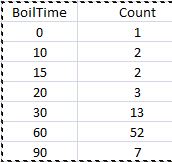dwhite60
Well-Known Member
Past few years I've been boiling an hour. Years ago I used to do ninety minutes.
Haven't noticed anything really different in flavor, clarity, or color (for the most part). I expect you might get some more protein coagulation boiling longer but I'm not having clarity problems.
So, how long do you boil?
All the Best,
D. White
Haven't noticed anything really different in flavor, clarity, or color (for the most part). I expect you might get some more protein coagulation boiling longer but I'm not having clarity problems.
So, how long do you boil?
All the Best,
D. White



